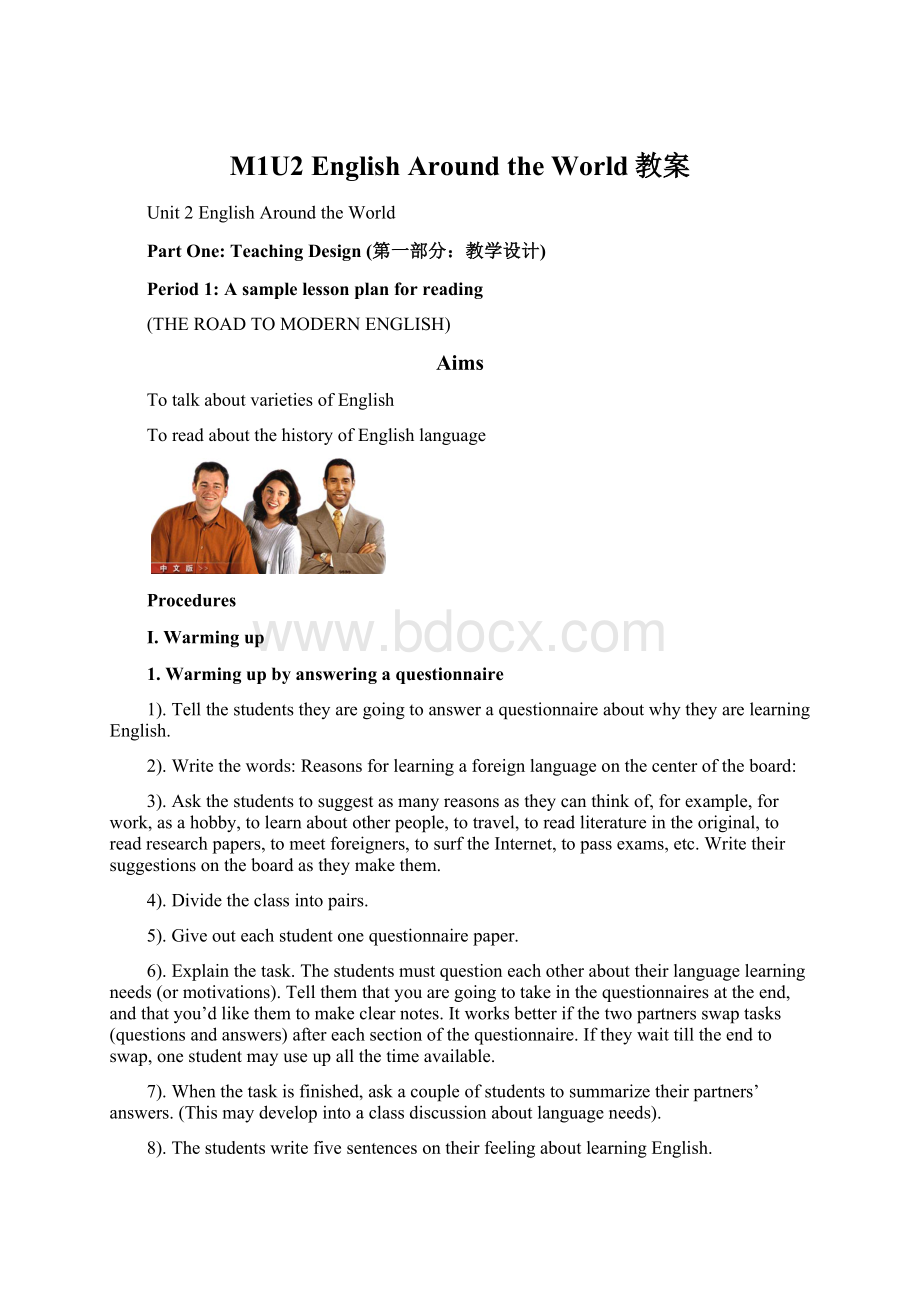 M1U2 English Around the World教案.docx
M1U2 English Around the World教案.docx
- 文档编号:5672701
- 上传时间:2022-12-31
- 格式:DOCX
- 页数:20
- 大小:88.10KB
M1U2 English Around the World教案.docx
《M1U2 English Around the World教案.docx》由会员分享,可在线阅读,更多相关《M1U2 English Around the World教案.docx(20页珍藏版)》请在冰豆网上搜索。

M1U2EnglishAroundtheWorld教案
Unit2EnglishAroundtheWorld
PartOne:
TeachingDesign(第一部分:
教学设计)
Period1:
Asamplelessonplanforreading
(THEROADTOMODERNENGLISH)
Aims
TotalkaboutvarietiesofEnglish
ToreadaboutthehistoryofEnglishlanguage
Procedures
I.Warmingup
1.Warmingupbyansweringaquestionnaire
1).TellthestudentstheyaregoingtoansweraquestionnaireaboutwhytheyarelearningEnglish.
2).Writethewords:
Reasonsforlearningaforeignlanguageonthecenteroftheboard:
3).Askthestudentstosuggestasmanyreasonsastheycanthinkof,forexample,forwork,asahobby,tolearnaboutotherpeople,totravel,toreadliteratureintheoriginal,toreadresearchpapers,tomeetforeigners,tosurftheInternet,topassexams,etc.Writetheirsuggestionsontheboardastheymakethem.
4).Dividetheclassintopairs.
5).Giveouteachstudentonequestionnairepaper.
6).Explainthetask.Thestudentsmustquestioneachotherabouttheirlanguagelearningneeds(ormotivations).Tellthemthatyouaregoingtotakeinthequestionnairesattheend,andthatyou’dlikethemtomakeclearnotes.Itworksbetterifthetwopartnersswaptasks(questionsandanswers)aftereachsectionofthequestionnaire.Iftheywaittilltheendtoswap,onestudentmayuseupallthetimeavailable.
7).Whenthetaskisfinished,askacoupleofstudentstosummarizetheirpartners’answers.(Thismaydevelopintoaclassdiscussionaboutlanguageneeds).
8).ThestudentswritefivesentencesontheirfeelingaboutlearningEnglish.
9).Collectthequestionnaires.
NeedsAnalysisQuestionnaire
Interviewer_______________
Interviewee_______________
Presentuse:
situationsandskills
Reading(faxes,letters&reports)
Listening&speaking(telephoning,meetings,negotiations,publicspeaking,socializing)
Writing(faxes,letters&reports)
Futureuse:
expectations&ambitions
2.Furtherapplying
Togetthestudentsthinkingaboutthetopicofthereadingpassage.
1).HaveastudentlistontheboardalltheEnglish-speakingcountriesintheworldthattheycanthinkof.
2).Givethestudentshintsabouttheplacestheyhaven’tmentioned.
3).ProvidethestudentswithanopportunitytothinkaboutthereasonsforthespreadofEnglisharoundtheworld.
★EnglishisoneoftheofficiallanguagesoftheOlympicGamesandtheUnitedNations.
★Englishdominatesinternationalwebsitesandprovidesnearlyallofthenewcomputerterminology.
★TourismandtradefromWesternEuropeandNorthAmericahascontributedtothespreadofEnglish.
★SatelliteTV,radioprogramslikeJoyFM,CDsand,ofcourse,HollywoodfilmsallbroadcastEnglishintoChina.Also,anumberofChinesefilmsincludeEnglishsubtitles.
II.Reading
1.Skimming
Readquicklytogetthemainideaofthetext.
Letthestudentsfindoutkeysentenceofeachparagraphoraskthemtosummarizethemainpointforeachparagraphintheirownwords.
Paragraph1:
ThespreadoftheEnglishlanguageintheworld
Paragraph2:
Nativespeakercanunderstandeachotherbuttheymaynotbeabletounderstandeverything.
Paragraph3:
Alllanguageschangewhenculturescommunicatewithoneanother.
Paragraph4:
EnglishisspokenasaforeignlanguageorsecondlanguageinAfricaandAsia.
2.Scanning
ReadtolocateparticularinformationandcompletethecomprehendingExerciseOne.
3.Followingup
Workingroups.Discussthetwoquestionsandthenasktwogroupstoreporttheiranswerstotheclass.
1).DoyouthinkitmatterswhatkindofEnglishyoulearn?
Why?
Possibleanswer:
Idon’tthinkso.Herearethereasons:
★Nativespeakersfromdifferentpartsoftheworldhavenodifficultyinunderstandingeachotherdespitethefactthattheyspeakabitdifferently.
★ItisnecessaryforustolearnthenarrowdifferencebetweendifferentkindsofEnglishifwehopetocommunicatefluentlywithnativespeakersofEnglishfromallovertheworld.
★DifferentkindsofEnglishhavethesamelanguagecore.Ifyouhavegotagoodcommandofonekind,youwillalmosthavenodifficultyunderstandinganotherkindofEnglish.
(Anypersuasiveandsupportingreasonthestudentsgivecanbeaccepted.)
1)WhydoyouthinkpeopleallovertheworldwanttolearnEnglish?
Possibleanswer:
ThereasonswhypeopleallovertheworldwanttolearnEnglish:
★Witheconomyglobalization,Englishhasbecomethebestbridgetoservethepurposeofpeopleallovertheworldcommunicatingwithoneanother.
★However,likeallmajorlanguagesintheworld,Englishisalwayschanging.Inordertoadjusttonativespeakersfromdifferentpartsoftheworld,itisamustforpeopleallovertheworldtolearnEnglish,whetherinEnglishspeakingcountriesorinnon-Englishspeakingcountries.
★Also,peoplefromdifferentpartsoftheworldspeakEnglishwithvariousaccentanddialects,andpeoplehavetolearnaboutthedifferencebetweendifferentkindsofEnglishinordertoavoidmisunderstandingwhilecommunicating.
(Allpersuasivereasonscanbeaccepted.)
4.Languagefocus:
1)evenif=eventhough:
inspiteofthefact;nomatterwhether:
Helikestohelpusevenifheisverybusy.
2)communicatewith:
exchangeinformationorconversationwithotherpeople:
Helearnttousebodylanguagetocommunicatewithdeafcustomers.
3)actually=infact:
usedwhenyouareaddingnewinformationtowhatyouhavejustsaid:
We’veknownforyears.Actually,sincewewerebabies.
4)bebasedon…:
5)makeuseof:
usesth.available
6)Onlytimewilltell:
tosaythatsomethingcanonlybeknowninthefuture:
WillChina’snationalfootballteamenterforthenextfinalsoftheWorldCup?
Onlytimewilltell.
LanguageChunksfromUnit2Englisharoundtheworld
bedifferentfrom,payarole(part)in,becauseof,either…or…,in/onateam,thenumberof/anumberof,thaneverbefore,evenif,compupto,overtime,communicatewith,bebasedon,makeuseof,haveone’sownidentity,suchas,Onlytimecantell,nativespeaker,aswellas,solveaproblem,believeitornot,nosucha…,allovertheworld,atthetop(bottom)of,penfriends,tothisday,sumup,Pardon?
begyourpardon,goabroad,beusedfor,moreofa…,encouragesb.todosth.,workon,feellikesth.,fromtimetotime,English-speakingcountries,fromone…toanother,dobusiness,ontheair,wouldlikesb.todo,makenotes,fightagainst,keep…asecret,eventhough,savetime(money),aformof…
Period2:
AsamplelessonplanforLearningaboutLanguage
(IndirectSpeech(II)requests&commands)
Aims
Todiscoverusefulwordsandexpressions
Todiscoverusefulstructures
Procedures
I.DirectandIndirectSpeech
DirectSpeech
IndirectSpeech
simplepresent
Hesaid,“Igotoschooleveryday.”
simplepast
Hesaid(that)hewenttoschooleveryday.
simplepast
Hesaid,“Iwenttoschooleveryday.”
pastperfect
Hesaid(that)hehadgonetoschooleveryday.
presentperfect
Hesaid,“Ihavegonetoschooleveryday.”
pastperfect
Hesaid(that)hehadgonetoschooleveryday.
presentprogressive
Hesaid,“Iamgoingtoschooleveryday.”
pastprogressive
Hesaid(that)hewasgoingtoschooleveryday.
pastprogressive
Hesaid,“Iwasgoingtoschooleveryday.”
perfectprogressive
Hesaid(that)hehadbeengoingtoschooleveryday,
future(will)
Hesaid,“Iwillgotoschooleveryday.”
would+verbname
Hesaid(that)hewouldgotoschooleveryday.
future(goingto)
Hesaid,“Iamgoingtoschooleveryday.”
presentprogressive
Hesaid(that)heisgoingtoschooleveryday.
pastprogressive
Hesaid(that)hewasgoingtoschooleveryday
DirectSpeech
IndirectSpeech
auxiliary+verbname
Hesaid,“Doyougotoschooleveryday?
”
Hesaid,“Wheredoyougotoschool?
”
simplepast
HeaskedmeifIwenttoschooleveryday.*
HeaskedmewhereIwenttoschool.
imperative
Hesaid,“Gotoschooleveryday.”
infinitive
Hesaidtogotoschooleveryday.
DirectSpeech
IndirectSpeech
simplepresent+simplepresent
Hesays,“Igotoschooleveryday.”
simplepresent+simplepresent
Hesays(that)hegoestoschooleveryday.
presentperfect+simplepresent
Hehassaid,“Igotoschooleveryday.”
presentperfect+simplepresent
Hehassaid(that)hegoestoschooleveryday.
pastprogressive+simplepast
Hewassaying,“Iwenttoschooleveryday.”
pastprogressive+simplepast
Hewassaying(that)hewenttoschooleveryday.
pastprogressive+pastperfect
Hewassaying(that)hehadgonetoschooleveryday.
DirectSpeech
IndirectSpeech
can
Hesaid,“Icangotoschooleveryday.”
could
Hesaid(that)hecouldgotoschooleveryday.
may
Hesaid,“Imaygotoschooleveryday.”
might
Hesaid(that)hemightgotoschooleveryday.
might
Hesaid,“Imightgotoschooleveryday.”
must
Hesaid,“Imustgotoschooleveryday.”
hadto
Hesaid(that)hehadtogotoschooleveryday.
haveto
Hesaid,“Ihavetogotoschooleveryday.”
should
Hesaid,“Ishouldgotoschooleveryday.”
should
Hesaid(that)heshouldgotoschooleveryday.
oughtto
Hesaid,“Ioughttogotoschooleveryday.”
oughtto
Hesaid(that)heoughttogotoschooleveryday.
II.Discoveringusefulwordsandexpressions
1.Workinpairs.Doexercises1,2,3and4.Thenchecktheansweryou’reyourclassmates.Theteacherhelpsthestudentsdiscoverthedifferenceinprepositions.
2.Playthetapeforthestudentstolistenandaskthemtomarkthesentencestressandintonation.Thenpracticereadinginpairs.
(Theteacherbringsthestudents’attentiontotheBritishandAmericanwordsthataredifferentbuthavethesamemeaning.)
III.Discovering
- 配套讲稿:
如PPT文件的首页显示word图标,表示该PPT已包含配套word讲稿。双击word图标可打开word文档。
- 特殊限制:
部分文档作品中含有的国旗、国徽等图片,仅作为作品整体效果示例展示,禁止商用。设计者仅对作品中独创性部分享有著作权。
- 关 键 词:
- M1U2 English Around the World教案 World 教案
 冰豆网所有资源均是用户自行上传分享,仅供网友学习交流,未经上传用户书面授权,请勿作他用。
冰豆网所有资源均是用户自行上传分享,仅供网友学习交流,未经上传用户书面授权,请勿作他用。


 对中国城市家庭的教育投资行为的理论和实证研究.docx
对中国城市家庭的教育投资行为的理论和实证研究.docx
